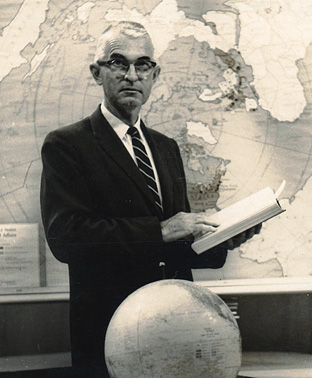Origin of the Cultural Approach to History

O. Turner Ivey
O. Turner Ivey’s vision to change the way we teach history.
Responding to concerns expressed by educators in the Montgomery, Alabama school system, Oliver Turner Ivey, Emeritus Professor of History at Auburn University, submitted a grant proposal to the state of Alabama. He proposed the development of curriculum materials and instructional techniques for adapting and implementing his historical method of cultural analysis to primary and secondary education. Professor Ivey had over twenty years of success in post-secondary education and felt that such an approach would translate well to public and private history classrooms. He was deeply committed to quality education. Public Law 89-10, the Elementary Secondary Education Act, Title III, awarded funding for the project to Professor Ivey and the Montgomery school system.
Over a three year period, beginning in June of 1971, a group of 26 local educators, Professor Ivey, Dr. Andrew Weaver, Auburn University, and other university personnel took part in adapting this approach to primary and secondary classrooms as well as developing the necessary materials. An eight-week intensive training program took place the first year, followed by two summer institutes and numerous meetings through the school year to refine the materials. The project designed methods and materials specifically customized for a seventh-grade World History course. The methods and materials were field tested, involving approximately 6,000 students in the Montgomery school system with much success. Not only were students favorable to the Cultural Approach, parents’ response was overwhelmingly positive as well. They applauded the program’s ability to engage students in analytical and creative thinking. With the Cultural Approach, students gained a new understanding of how their activities and aspirations ‘fit’ within the larger frame work of their society. In short, history, for these students, became exceedingly relevant to their lives and, therefore, a topic of great interest. Thus, the program achieved its goals. Moreover, the potential for application continues.
In 2010, Columbus State University (Georgia), was awarded a grant by the Carol Lawson Ivey Foundation, steward of Professor Ivey’s work, to update and reintroduce the Cultural Approach to a new generation of educators and students. Subsequently, Columbus State University is updating and republishing Professor Ivey’s curriculum materials, including a section on how to use the Cultural Approach to meet state and national curriculum standards. They are also holding summer seminars to give educators a hands-on introduction to the Cultural Approach. Lastly, and perhaps most importantly, this website has been developed to make resources available to educators interested in learning about and using the Cultural Approach in their own classrooms.
More
The Ivey Legacy
Teacher Testimonial
The Cultural Approach to Summer Camps
Over the Summer the Ivey Center was delighted to play host to the Timekeepers Camp! Our educators and their students become enthralled in the immersive experience that allowed them to travel back in time! Some highlights of the event can be seen in the video below.
Timekeepers Summer Camp

